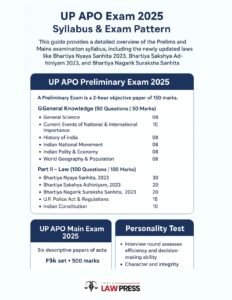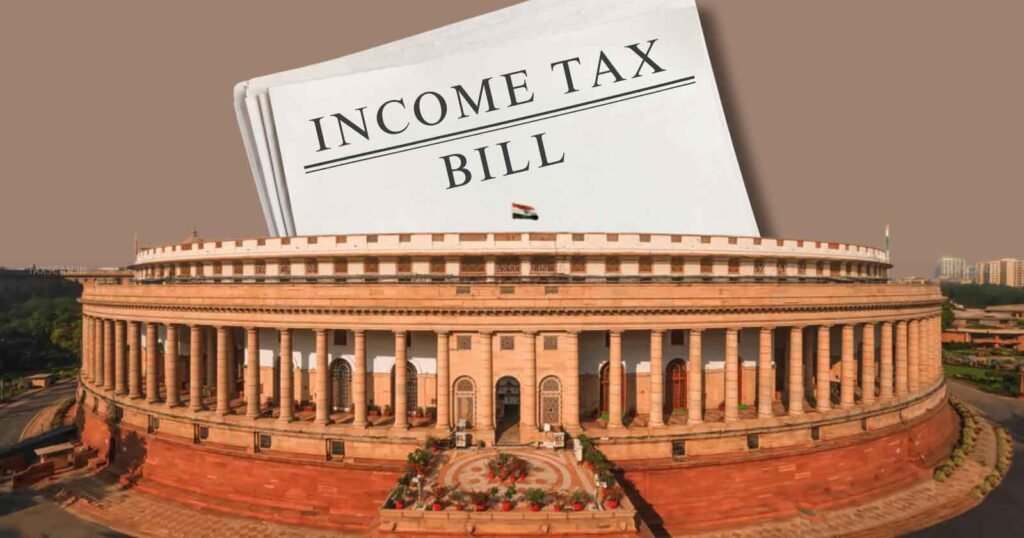Complete UP APO Exam 2025 syllabus & exam pattern guide – Prelims & Mains, latest laws (BNS, BSA, BNSS), important acts, personality test details, and preparation strategy for aspiring Assistant Prosecution Officers.
If you are preparing for the Assistant Prosecution Officer (APO) Exam 2025, you must be aware of its latest syllabus, exam pattern, and preparation strategy. This guide provides a detailed overview of the Prelims and Mains examination syllabus, including the newly updated laws like Bhartiya Nyaya Sanhita 2023, Bhartiya Sakshya Adhiniyam 2023, and Bhartiya Nagarik Suraksha Sanhita 2023.
Let’s dive into the exam pattern and subject-wise syllabus to help you streamline your preparation effectively.
UP APO 2025 Exam Overview
The Assistant Prosecution Officer Exam 2025 consists of two stages:
1. Preliminary Examination
2. Main Examination, followed by a Personality Test
The merit list will be prepared based on marks obtained in the main examination + interview score.
UP APO Preliminary Exam 2025 – Exam Pattern & Syllabus
The Prelims is a 2-hour objective paper of 150 marks.
It is divided into two parts – General Knowledge and Law.
Part I – General Knowledge (50 Questions | 50 Marks)
Topic Marks/Questions
- General Science 08
- Current Events of National & International Importance 10
- History of India 08
- Indian National Movement 08
- Indian Polity & Economy 08
- World Geography & Population 08
Preparation Tip: Focus on NCERTs for History, Polity, and Geography, read newspapers daily for Current Affairs, and revise basic science concepts.
Part II – Law (100 Questions | 100 Marks)
This section tests your knowledge of important Acts and Laws.
Topic Marks/Questions
- Bhartiya Nyaya Sanhita, 2023 30
- Bhartiya Sakshya Adhiniyam, 2023 20
- Bhartiya Nagarik Suraksha Sanhita, 2023 20
- U.P. Police Act & Regulations 15
- Indian Constitution 10
Preparation Tip: Study bare acts thoroughly and practice previous year question papers for better accuracy.
UP APO Main Exam 2025 – Exam Pattern & Syllabus
The Mains Exam consists of six descriptive papers of a total 500 marks.
Paper Marks Duration
- General Hindi (High School Level) 100 3 hrs
- General English (High School Level) 50 3 hrs
- General Knowledge 50 1.5 hrs
- Criminal Law & Procedure 100 3 hrs
- Shakshya Adhiniyam 100 3 hrs
- Anya Adhiniyam 100 3 hrs
Important Acts under ‘Anya Adhiniyam’
Questions will be asked from the following legislations:
- Arms Act, 1959
- Protection of Children from Sexual Offences (POCSO) Act, 2012
- Probation of Offenders Act, 1961
- SC/ST (Prevention of Atrocities) Act, 1989
- Juvenile Justice (Care and Protection of Children) Act, 2000
- Dowry Prohibition Act, 1961
- Prevention of Corruption Act, 1988
- Narcotic Drugs and Psychotropic Substances Act, 1985
- Child Labour (Prohibition and Regulation) Act, 1986
- Information Technology Act, 2000
- Domestic Violence Act, 2005
- U.P. Control of Goondas Act, 1970
- U.P. Gangsters and Anti-Social Activities (Prevention) Act, 1986
- U.P. Control of Public Gambling Act, 1961
- U.P. Excise Act, 1910
- Motor Vehicles Act, 1988
- Criminal Law (Amendment) Act, 2013
- Bharatiya Nyaya (Second) Sanhita, 2023 (as amended)
Personality Test / Interview (50 Marks)
The interview round assesses your:
- Efficiency & decision-making ability
- Character & integrity
- Personality & confidence
- Physical fitness
This stage is crucial because it can make a difference in the final merit list.
 UP-APO-Exam-2025-Syllabus-and-Exam-Pattern
UP-APO-Exam-2025-Syllabus-and-Exam-Pattern
Preparation Strategy for UP APO Exam 2025
- Cover the Bare Acts First: Focus on understanding sections, illustrations, and recent amendments.
- Revise Current Affairs Regularly: Follow trusted sources like PIB, The Hindu, and Indian Law Press updates.
- Practice Previous Year Papers: Improves speed and accuracy for both prelims and mains.
- Work on Writing Skills: For mains, practice descriptive answers with proper legal language.
- Mock Interviews: Build confidence and communication skills before the personality test.
Conclusion
The UP APO Exam 2025 demands a strong grasp of law subjects, general knowledge, and writing skills. Start your preparation early, make a time-bound study plan, and focus on concept clarity + answer writing practice to secure a top rank.
Also Read: Top 10 Landmark Supreme Court Judgments Every Law Aspirant Must Know





